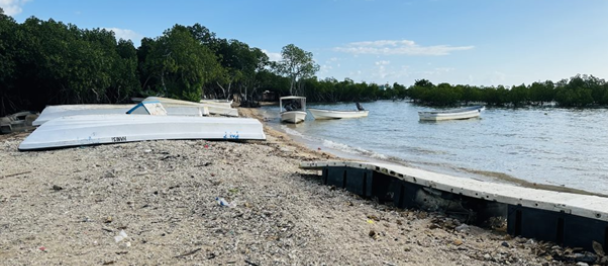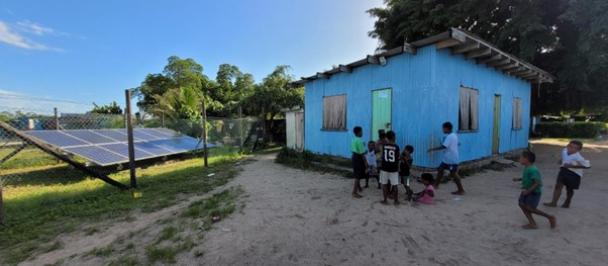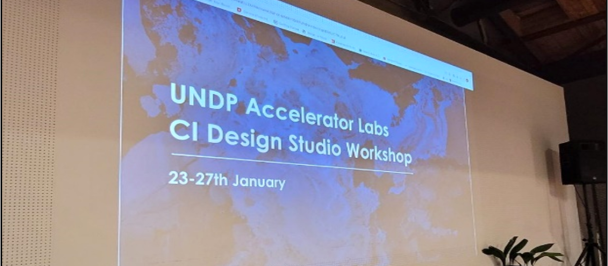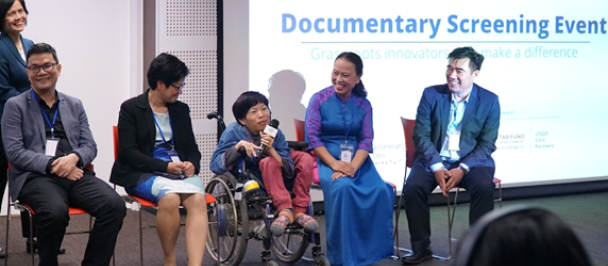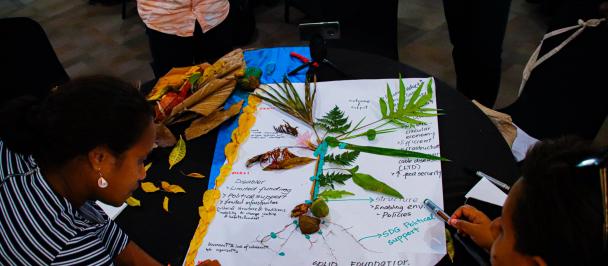Viewing the wicked space using multiple lenses - the story of Mount Korobaba, Fiji
May 24, 2022
Circularity of plastics and waste management is top of the list for 2022 and one of the Accelerator Lab Pacific’s key focus areas for the year. Increased production of plastic products, coupled with poor waste management has left our environment laden with plastic waste that is threatening natural ecosystems and biodiversity. In the Pacific, there is limited capacity for recycling and majority of plastic waste ends up in landfills, is burned in open fires which releases harmful toxins into the environment or is discarded in unsanitary open dumpsites where there is a high risk of this plastic waste leaking into the environment and posing a serious threat to the Pacific’s most precious resource – our Ocean.
In analyzing the plastics value chain, we recognized that there are contributing factors to this complex issue at every stage of the plastics lifecycle – from production, manufacture, utilization, to disposal. After conducting interviews with various stakeholders in the plastics space, a recurring issue expressed by many stakeholders was the difficulty in changing behavioral mindset. It has become common to use single-use plastic products every day, and many people do not pay a second thought to the way these are disposed. This made us wonder – does this nonchalant attitude towards plastic use and disposal really have a significant contribution to the growing plastics issue? Our question was soon answered, when one of our former Accelerator Lab interns, Jamil Suleman, decided to join an ‘Adventure with a Purpose’ hike with his friends.
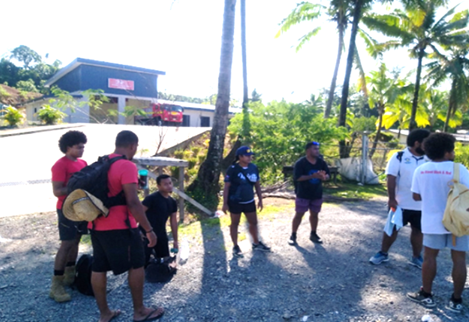
The team discusses the plan before embarking on the trek.
The objective of ‘Adventure with a Purpose’ was for Jamil and his friends to hike up the popular Mount Korobaba in Suva, Fiji and collect trash along the way.
The trek is open to the public and has become a popular weekend spot, with a beautiful view of the Suva city and harbor at the peak.
With all essentials in tow—food, water, and garbage bags—a determined group of nine people, Jamil included, set off on what would be a completely eye-opening adventure.
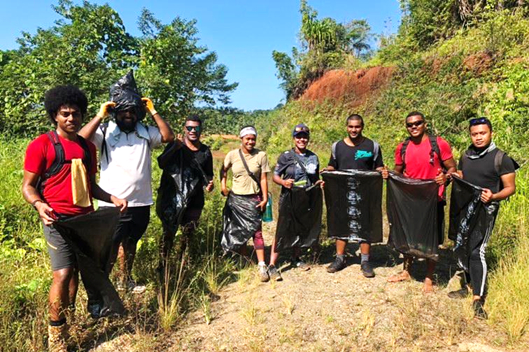
Ready for an exciting trek with garbage bags in hand.
During the first half of their climb up Mount Korobaba, they collected mainly plastic bottles, plastic bags, tin cans, shoes, and glass bottles—majority of which were in the bushes along the track, or partially stuck in the ground. As their garbage bags would fill up, they tied the full bags onto trees along the track to be collected on their return.
Closer to the peak, they noticed that they were collecting an increasing amount of food wrappers and empty water bottles—a possible indication of more lax disposal habits as physical exhaustion from the hike set in. To their shock and amusement, they had filled over 10 large garbage bags full of trash before reaching the peak.
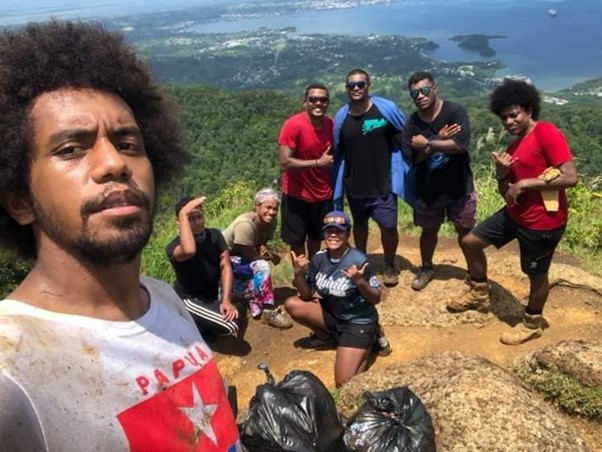
The team took a moment to enjoy the view from Mount Korobaba peak.
Finally, at the peak of the mountain, the group took a moment to take in the tranquil view and commend themselves on a great effort. However, it was not long before the groups excitement was interrupted by an overwhelmingly foul stench. Upon further inspection, they discovered a small rubbish dump accumulating just off the side of the peak. While the dump was located precariously just off the steep peak, one brave member of the group decided to make the descent to collect the trash from the dump and pass it up to the others for collection. Although they were not able to clear the entirety of the dump due to safety reasons, they filled another 9 large garbage bags from this dump alone.
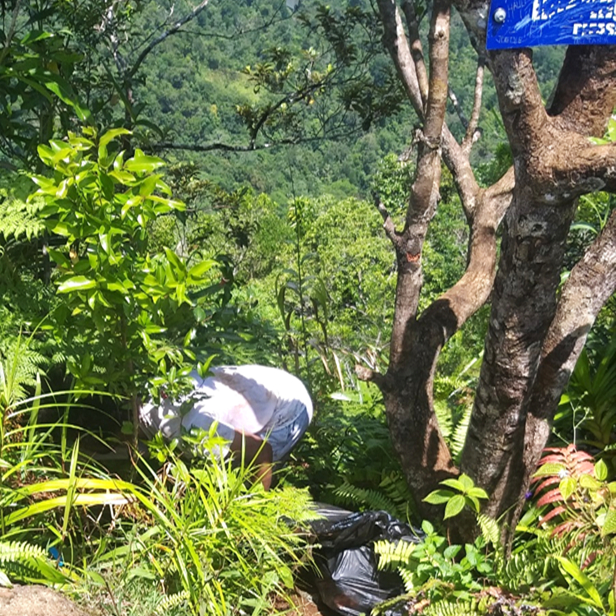
One member of the team carefully collects trash off the side of the steep peak.
At the end of the journey, the group had collected a total of 21 garbage bags full of trash - much more than they had anticipated, and while they felt accomplished by their efforts, there was a shared feeling of disappointment to know that many people had this inattentive mindset towards waste disposal and the environment.
When Jamil and his friends got to the base of the mountain, the group segregated the trash into various components and after conducting a quick analysis discovered that they had collected 60kgs of plastic bottles alone.
Jamil emotionally conveys that it was a sobering moment for the group knowing that we had a long way to go in addressing the plastic waste issue in our country, and that there is a clear need for a major shift in mindset regarding how we manage our waste.
While the journey to solving the plastics waste issue may be long, the accumulative efforts of all members of the community is what is going to have real change in addressing this complex challenge.
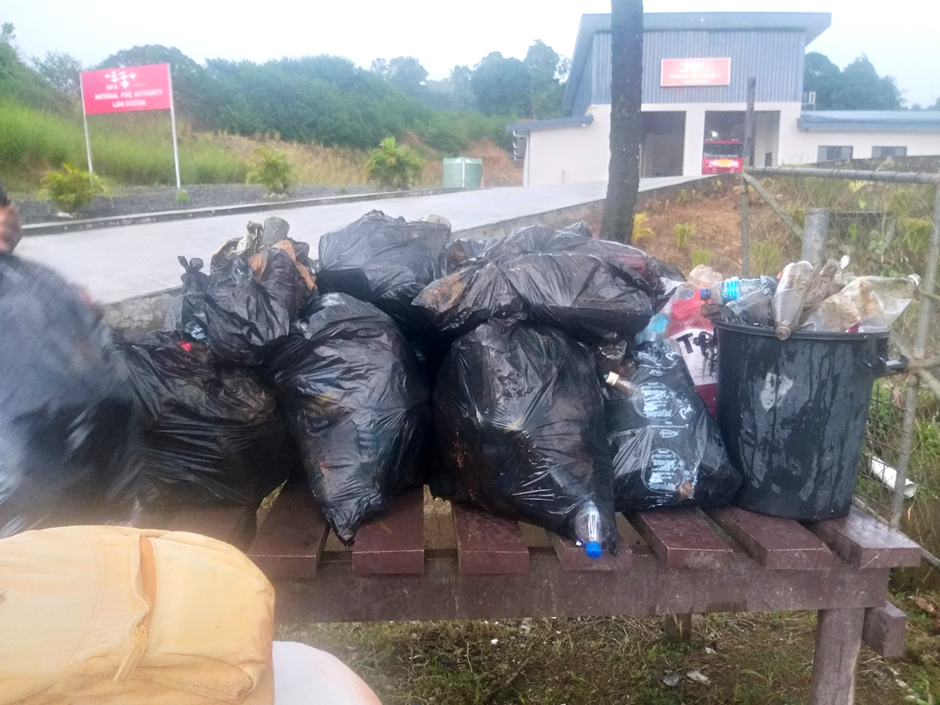
A total of 21 garbage bags containing single use water bottles were collected during the groups 'Adventure with a Purpose'.
We hope that in sharing Jamil and his friends Adventure with a Purpose, others will be inspired—not only to take part in similar initiatives, but also to take a moment to consider the effects of their actions before purchasing and disposing single-use plastic products.
Going forward, the Accelerator Lab Pacific will be hosting a systems design workshop which will help to inform the design of a portfolio of experiments to test possible pathways to creating a more circular economy for plastics in the Pacific. The workshop will include multiple stakeholders along the plastics value chain to ensure that the design of experiments encompass a whole-systems approach. Wicked problems, such as the plastics challenge, require nothing less than the combined efforts of all sectors of the society—we can no longer afford to work in silos if we truly want to create a more circular economy. A key learning from the Mount Korobaba experience reasserts the need for encouraging positive behavioural change for responsible waste disposals, reinforced by strengthened litter policies and regulations.
Acknowledgement
The UNDP Accelerator Lab is thankful to the group for coming up with such an innovative way of creating awareness on waste management, in particular the plastics crisis. The Accelerator Lab would also like to specifically acknowledge Epeli Lalagavesi for coming up with the 'Adventure with a Purpose' initiative. Jamil Suleman is a former intern with the Accelerator Lab for UNDP Pacific Office in Fiji.

 Locations
Locations

